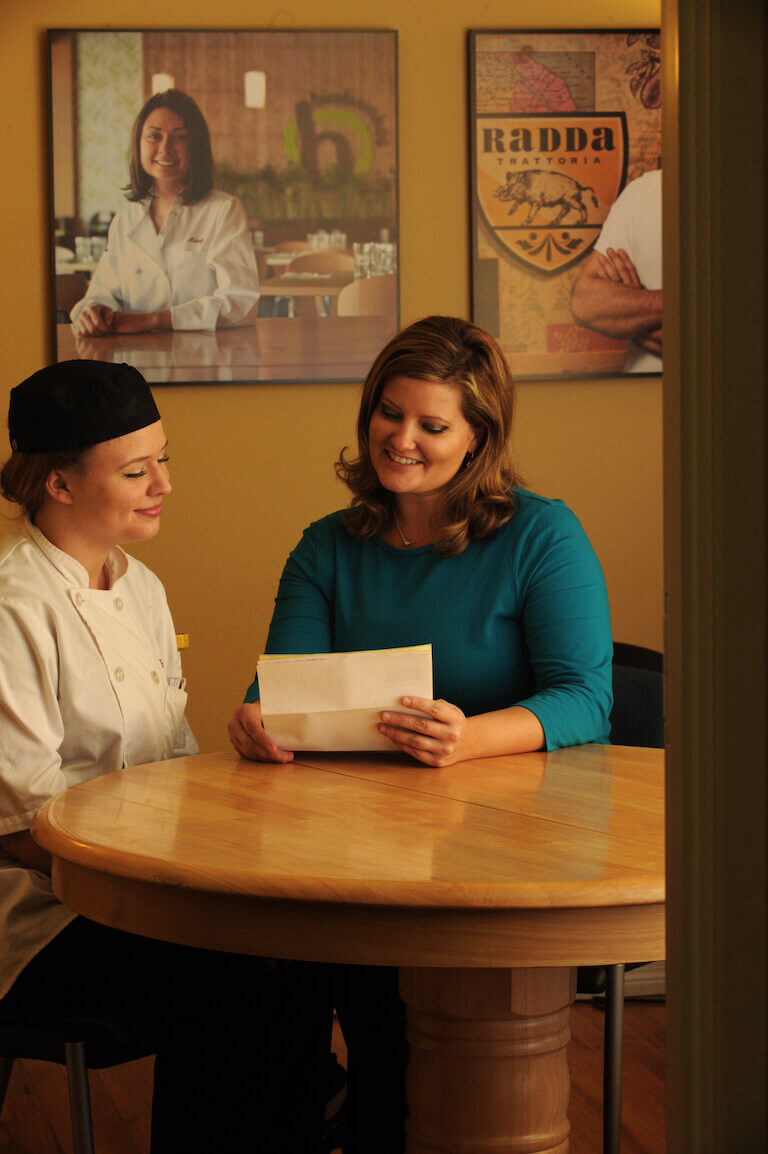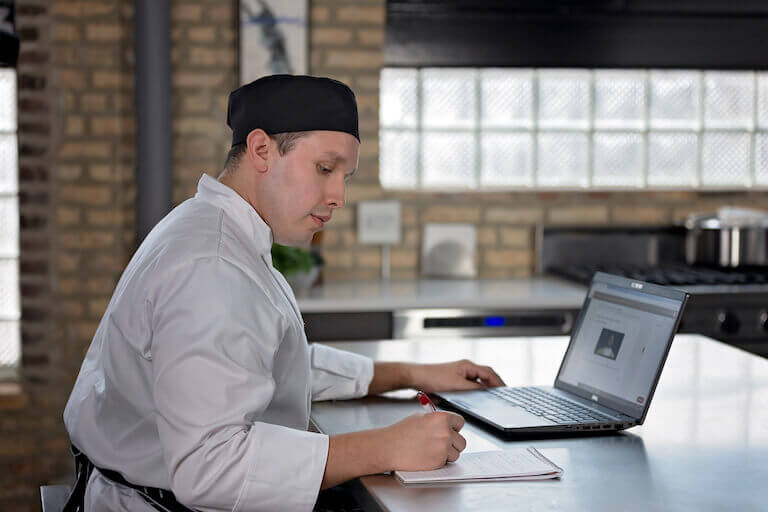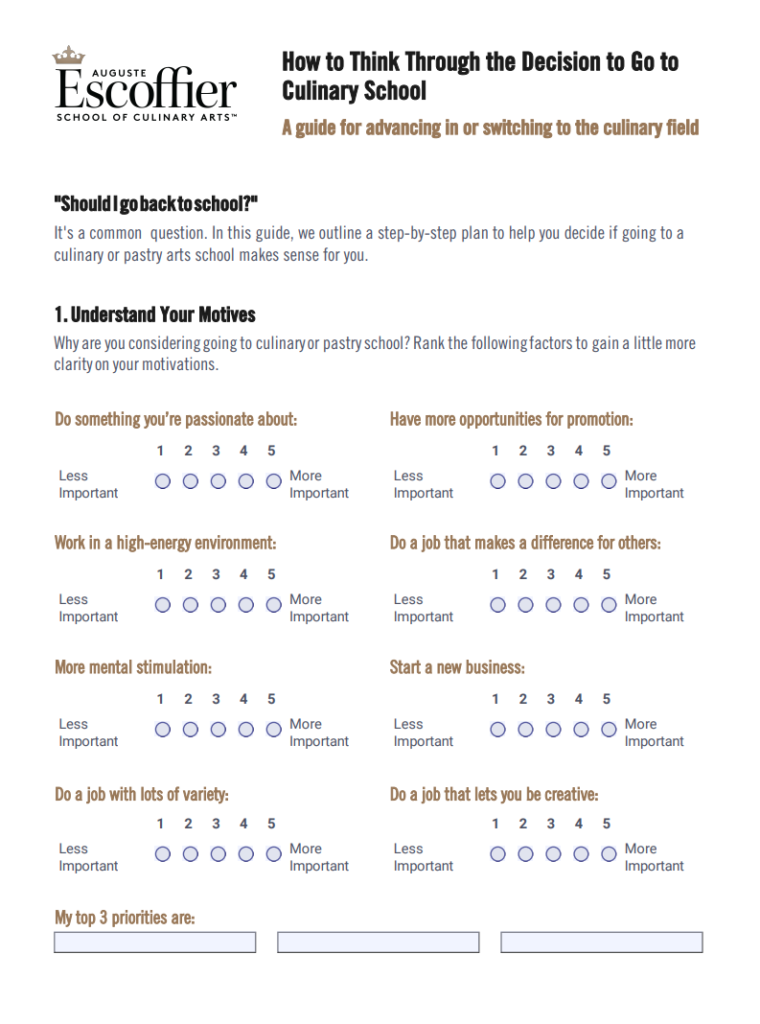Have you already started your culinary career without formal training and wondering whether a culinary or pastry arts degree or diploma could set you apart? Or are you on a completely different career path, secretly dreaming about following your passion in food?
This decision is big and not one to take lightly.
In this guide, we take you step by step through a structured decision-making process to help you decide if going to a culinary school or pastry school makes sense for you. It takes into account your personal motivations, how to pay for school, and the logistics of this important step.
You can also use this PDF Worksheet to fill in your answers and print it out, so that you can put together a solid plan as part of your ongoing research.
Plenty of people have made a mid-career change in pursuit of their dreams. If you’ve been interested in food as a hobbiest, an avid restaurant diner, or a cooking show enthusiast – attending culinary school could launch you into a new and rewarding career. And with online culinary school, baking school, plant-based culinary programs, and hospitality & restaurant operations management programs from Auguste Escoffier School of Culinary Arts, you can have the flexibility you’ll need to pursue your goals of cooking professionally.
Here’s what to consider as you ask yourself, “Should I go to culinary school?”
1. Understand Your Motives
What’s driving your decision to go to culinary or pastry arts school? Before making a big decision, it’s a good idea to gain clarity on what you really want and why.
Here are some questions to ask yourself. There’s no wrong answer, but it’s important that you’re clear on your motives before beginning your studies.
Rank the following factors in order of importance. Do you want to:
- Do something you’re passionate about?
- Work in a high-energy environment?
- Do a job that makes a difference to other people?
- Have a job with lots of variety?
- Have more mental stimulation?
- Start your own business?
- Do a job that lets you be creative?
- If you’re already in the field, are you looking for more opportunities for promotion?
When you’re talking to our Admissions Advisors, you’ll be able to tell them your motives and expectations. This understanding will help them guide you towards the career you want – both in your studies and after you graduate.
It will also give you focus if you study while still working at your current job. There is no “wrong” motivation for attending school. But if you want to get the most out of your time in school, clear motives will help to keep you on track.
If you’re not sure how to rank your priorities, don’t worry. Our Admissions Advisors can guide you and you can set your educational priorities together. They’re here to help you.
“I would say my choice of going to culinary school instead of a four-year college was worth it. I love cooking, and I wouldn’t have known if I hadn’t taken the chance of trying it first.”
Oscar Beltran, Escoffier Boulder Culinary Arts Graduate
2. Financing: How Will You Pay for Culinary or Pastry Arts School?
You need a solid financial plan in place to make a smooth transition from your past career to your new one, or to get your degree or diploma if you’re already working in the food business.
Start by considering your existing resources. If you’re attending culinary school online, you may be able to keep working to help pay for school. Also consider your savings or any financial input from family to determine how much you can allocate to your education investment.
Other ways to consider paying for culinary school include:
- Employer reimbursement. If you’re already working in the field, consider asking your employer to reimburse part of your tuition and fees.
- Student loans. Financial aid is available to those who qualify. Loans are a common way for people to pay for culinary school, but use discretion. Determine in advance how much you’ll be comfortable paying back down the road.
- Grants and scholarships for those who qualify. Check out these various scholarship and grant opportunities. Do some additional research to look for local or regional scholarships that you may qualify for as well.
- Active duty, military veterans and certain family members. If you’re separating from the military, or will be in the next year or two, there are federal grants and loans specifically for veterans and their spouses. With our online school you can start studying while you’re still active, or even while deployed overseas.
Be sure to complete the Free Application for Federal Student Aid (FAFSA) form to understand the wide variety of aid and federally-backed loan options that could be available to you.
You can always talk to a Financial Aid advisor to learn how to apply for financial assistance. Are you thinking of applying a few months or a year down the road? Our advisors can fill you in on the expenses you should expect, so you can start saving for them before you’ve even registered.
“Just filling out the application and the FAFSA were the most difficult things I had to do to get the process rolling. The Financial Aid Department was great at communicating with me. Jordan and the team at Escoffier were always emailing me back and letting me know where I was and how things were going.”
Brent Unruh, Boulder Culinary Arts Graduate

3. Research Programs of Interest
Are you going to aim for a degree or a diploma? Which program? Online or on-campus?
Your decision ultimately comes down to your goals and personal life situation. Many students who already have careers choose to continue working while studying, coordinating with their employers to work around their studies. Attending school online offers a bit more flexibility, but many students at our campuses in Austin, Texas and Boulder, Colorado also continue working in their current jobs while studying.
Our online programs even include a Success Coach for each student, and our Austin and Boulder campuses have advisors on staff to help identify obstacles, set goals and design academic plans if needed.
As you consider the right program for you, ask yourself the following questions:
Personal Considerations
- What are your family and other personal obligations? How will you balance those with school?
- Will you keep working? Will you need to change your work schedule?
- What will have to change in your daily and weekly habits or any upcoming plans?
- Can you meet the required study schedule?
School Considerations
- Is the institution accredited?
- Who are the faculty? What is their work experience and credentials?
- Have you seen the curriculum? Does the school teach things you want to learn?
- Does it require an externship where you can get hands-on training in a professional kitchen?
- If you need flexibility, does the school offer 100% online programs?

Logistical Considerations
- Do you meet the basic admission requirements, like having a high school diploma or GED?
- Can you meet the upcoming deadline for application?
As you work through these questions, you’ll see if any red flags come up that will need to be addressed before you’re ready to attend school.
4. Plan For Your Success
Higher education is a commitment. It takes time and effort to gain new skills in any field. Think through the number of hours you’ll be able to dedicate to your education each week.
Who can help hold you accountable to your dreams? Who in your life can call you out when you’re not living up to your commitments? It’s important to have friends and family members who will have the “hard” conversations with you if required, and celebrate your wins with you as you do the work.
Take time to work through your decision-making plan. Print out the worksheet and talk through your answers with people who know you well.
Before we wrap up this guide, here are two final thoughts…
Don’t Make a Rash Decision: Avoid These Mistakes
The decision to go back to school is a big one…so give it some solid thought.
According to career coach and Forbes columnist Kathy Caprino, there are five common mistakes people make when contemplating a career change.
- Running as far away as possible from your current career because it’s “broken” you.
- Not having a sound financial plan before making the leap.
- Not taking the time to examine what kind of work you really want next.
- Not doing enough research about your newly chosen career.
- Giving up on your change too quickly.
Take your time in the planning stage of this change. By the time you contact us to begin your professional culinary training – either online or on campus – you’ll have the vision, clarity and conviction to succeed.

It’s Never Too Late to Make a Change
Don’t buy into the notion that it’s too late to make a change in your career path. We see students of all ages and at all stages of their work life taking advantage of our online culinary school classes or joining us at our campuses in Boulder or Austin. Your life experience can actually be an asset if you’re launching into the culinary or pastry arts.
No matter what’s motivated you to make the change, we’re here to support your learning journey. Our Career Services staff give students and graduates the resources and knowledge they need to help find and flourish in their next job. You can read a few of our alumni success stories here. Then contact us to find out more about your next career in the culinary or pastry arts.
Did you find this article helpful? Here are some other resources you might like:
- How Much Education Do You Need to Become a Chef?
- Job or School: Why Not Both?
- Should Restaurant Owners Go to Culinary School?
This article was originally published on April 20, 2020, and has since been updated.



